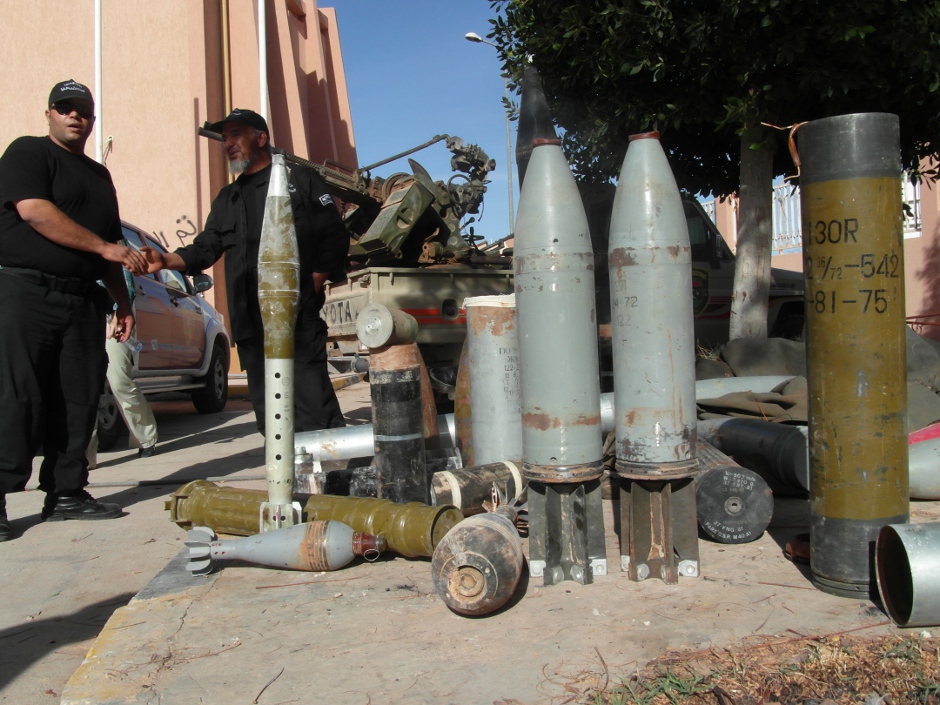Authorities seek to prove Bani Walid was pro-Qaddafi stronghold -Libya Herald http://www.libyaherald.com/2012/11/11/authorities-seek-to-prove-bani-walid-was-pro-qaddafi-stronghold-as-divisions-remain/ … via @libyaherald
3:14 PM - 11 Nov 12 · Details
Authorities seek to prove Bani Walid was pro-Qaddafi stronghold
By Mathieu Galtier.
Bani Walid, 11 November:
Heavy weapons and documents purporting to demonstrate fealty with the Qaddafi regime were put on display in Bani Walid yesterday, by authorities seeking to demonstrate that the town was still loyal to the former dictator.
In a closely restricted visit organised by the Ministry of Interior on Saturday, the Libya Herald was shown inside the former office of Bani Walid’s local radio station, which continued to project messages proclaiming the town’s fervent defiance until late in the recent conflict. Now, like at the entrance to the Benghazi war museum, visitors have to trample over a portrait of Muammar Qaddafi as they enter.
The building previously served as the headquarters of the 1993 Brigade (the year Bani Walid staged its own attempted coup against the Qaddafi regime), from which its commander Salam Al-Waer only fled once the army entered the town last month.
Now, the office is used as a political and media centre, from which the national army’s Lieutenant Colonel Abu Hajar eagerly welcomes visiting journalists. He has been in charge of security in Bani Walid since it was declared liberated on 24 October.
Hajar’s first task is to persuade everybody that the town is now fully under the government’s control: “There are no more pockets of resistance inside the city” he insists. “We have collected several weapons found inside the schools and in the university. Schools were used as well as factories to mend weapons. Moreover, we have discovered Qaddafi documents inside the radio building”, he adds.
The weapons in question have been put on display in the courtyard, and include casings for some heavy weapons, including rockets. Inside the building, we are shown cupboards full of documents purportedly from the Qaddafi era. Many of the papers are actually speeches of the former ‘Guide’, which have been left untouched in the former radio station as proof that the main media source in Bani Walid was pro-Qaddafi.
During the ten months preceding October’s attack, Qaddafi loyalists had converted a former school into an office together with a secret jail with three small cells. “There were three prisoners from Zliten and two from Misrata when we took the place”, a policeman explains.
The green-coloured walls of the school were tagged with strong anti-revolutionary slogans like “Warfallas produce men who like eating hungry rats”.
In spite of the supposedly strong pro-Qaddafi sentiment present amongst the town’s population, the authorities insist that ordinary civilians were not a target during the recent operation.
“There has been no retaliation in any of the missions lead by the police. We are not against the population”, Hajar insists.
To date, however, the authorities have failed to release the names of more than 100 Qaddafi loyalists reportedly arrested during the operation, as mentioned during a press conference on 24 October [http://www.libyaherald.com/2012/10/24/bani-walid-falls/]. Moreover, citizens of Bani Walid have frequently complained about abuses of militias against Warfallah in the town, together with the destruction of houses and shops asLibya Herald revealed on Wednesday[www.libyaherald.com/2012/11/07/bani-walid-complacency-from-the-authorities-resignation-from-the-population/].
During the press trip, journalists were forbidden from visiting the Darah area, where a dozen houses were burned during the attack. Journalists have also had difficulties speaking to the population on account of close monitoring at all times by policemen.
Nevertheless, the government insists it wants now to help Bani Walid. “The government will give money to the families whose houses were burned to rent accommodation for three months, and the reconstruction of houses will be payed for by the government as well”, insists the outgoing Minister of Local Government, Mohamed Harari.
“Security has been implemented at a 95 per cent level, and tomorrow [Sunday], the schools should reopen. 70 to 80 per cent of the electricity network is back, and at least 70 per cent of internally displaced people have now returned to Bani Walid.
In the hospital, medical staff confirm that the government has been helping and they have received drugs and equipment. “But right now, there is a lack of drinkable water and food”, a nurse regrets.
Outside observers believe that the difficulties now being confronted by Bani Walid are not out of the ordinary: “The city is emerging out of war and because of the complexity of the situation, we don’t expect it to return to a 100 per cent normal life in just a couple of weeks”, the UN’s director of political affairs, Muin Shreim, tells the Libya Herald.
“The situation is being handled by the Libyan state, and they are doing a good job”, he continues. “The population have confidence in the national army, not in other armed groups. But it takes a long time to achieve national reconciliation.”
Quite so. In the main square of the Bani Walid, two slogans proclaiming “Qaddafi is a good man” have been painted over in black, whilst an abusive slogan against the town has been painted in its place.

